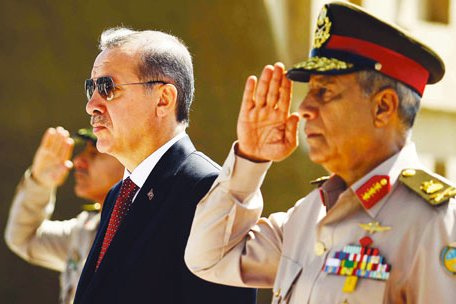Erdogan’s Thoughtfulness in Visit to Egypt

Recep Tayyip Erdogan, the Turkish prime minister, wisely paid a visit to Egypt. The purpose of the visit was not only the fostering of mutual relations with Egypt, but also extensive publicizing of the issue of recognition of Palestine in the UN among the Arab countries. IRD reviews the issue in an interview with Bahram Amir-Ahmadian:
IRD: What is your analysis of the Erdogan’s visit to Egypt? What was the purpose of the visit?
BA: Egypt is a priority to Turkey. It may have some reasons: First, Turkey has had a plan to have close relations with Egypt since the reign of Necmettin Erbakan, because Northern Africa is economically valuable for Turkey due to its big markets situated in the Islamic Sunni society. Turkey had control over the Egyptian borders during the Ottoman rule, and also cultural and religious relations with the country since olden times. When it comes to Egypt, the big foreign market of international trade is considered, as it can be in the hands of Turkey.
Second, Egypt is restructuring itself culturally, politically and economically. Turkey can be introduced as a model for Islamic countries, especially Sunni ones. Thus, Erdogan chose Egypt for a visit. As you may know, some sectors of the Egyptian Muslim Brotherhood constituted a new party called Justice and Development, using the AKP as a successful and good model.
Therefore, Erdogan chose Egypt now because of its high population, the large market, the investment opportunity and its current situation in which the anti-West atmosphere provides the appropriate opportunity for the Turkey’s presence in the country.
IRD: Mr. Erdogan also negotiated with the Arab League in Egypt. How do you evaluate the Turkish policy regarding the Arab world?
BA: It seems that in the Turkish ideology, a moderate Islam is defined, and a few Islamic extremists can be found. This trend created a form of eastern democracy that held a balance between the government and the people from the 80’s onward, when Mr. Turgut Özal was known as the architect of the new Turkish economy. This balance is not a Laic approach and can be a good model for Arab counties.
In fact, the changes in North Africa have not been made to have Islamic governments; even the new Libyan leader stated that the future government would be based on Islam-- not an Islamic one. It seems that the Arab Union supports the Turkish ideas for constituting new ruling systems to stabilize the region. Because any extreme approach may lead to Salafism or a radical Islam, and in such an atmosphere no one enjoys their benefits due to discrepancies and confrontations.
IRD: How can Turkey’s position on Palestine be effective on the Arab countries’ position on the issue and on the recognition of Palestine?
BA: Turkey experienced a turning point in its relations with Israel due to the AKP and Erdogan’s adopted position against Shimon Peres in the Davos Meeting, as it was a strategic plan to dismiss Israel and to attract the support of Islamic countries. The Islamic world has energy, big markets and high population, while Israel does not enjoy any of these. Thus, Turkey preferred to turn to the Islamic countries.
Turkey has the power to invest in foreign countries, where there is no domestic opportunity. Therefore, it is the Islamic countries with big markets that can bring Turkey many profits while the Western market experiences a crisis. Egypt, then, can be a very good target, as it enjoys an extensive domestic market together with the foreign tourism market.

